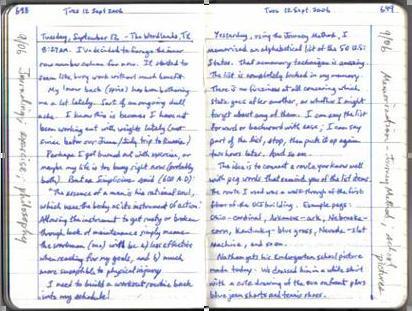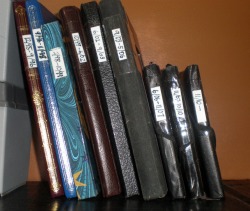- Home
- Keeping a Journal
Keeping a Journal to Remember Events
Some people, like me, have trouble recalling the details of events. This is called "episodic" memory. So, years ago, I started keeping a journal to preserve these precious memories.
No matter how good your memory is, recollection of your life's events will probably fade as the years go by. My advice is to write these events down in a journal as they happen.
Writing extends your memory, facilitates editing and clarifies your thinking. You can write down more than you can easily remember. - Dr. Jordan Peterson
You may have heard of journaling before; it's similar to keeping a diary. Some dictionaries make virtually no distinction between keeping a journal and a diary:
Definition of "journal": a diary; a daily written record of (usually personal) experiences and observations.
Young people may be tuning me out at this point, but I hope they don't. Now that I am getting older, I wish I had started my journaling at a younger age. I did start my journal years ago, on January 1, 1996 as part of a New Year's resolution.
Journal Vs. Diary
I think journaling is different from keeping a diary in terms of focus. I imagine a diary as something a teenager keeps to write down private thoughts about feelings and relationships. A journal can have some of that, but the focus (at least for me) is more toward the world around me.
For example, if I travel to visit the Great Meteor Crater in Arizona, I'll write down the things I did there, what my impressions of the place was like, and my thoughts about the significance of the trip, and so on. Much of my journal is internal, but much external too. I haven't really recorded much that would embarrass anyone. No gossip, for example.
Having written hundreds of pages over the years, I have developed a certain style and pattern, even in the materials I use, that seems to work well. Here's a page from my journal as an example:

Example of My Journal Layout
The purpose of keeping a journal is to write down the things that I want to be able to remember 10, 20, 30, or more years from now. The special experiences of a lifetime, preserved on those pages. I'd like to think that some day my grandchildren or great-grandchildren might like to read it.
Benefits of Keeping a Journal
Keeping a journal is a way of preserving the memories of events against the ravages of time and forgetfulness.
Try, for a moment, to think back to some of the important events in your own life. Get a sense for how clearly you remember the small but important things about those events.
Do you really remember all the important details - people's names, the complexity of your feelings, the little things that happened or even all the big experiences you had? If you write them down soon after, you'll have a wonderful resource for jogging your memory.
And for someone experiencing memory loss due to brain disease or trauma, a daily journal can be a powerful memory aid to keep track of events.
About Journal Books
After several years of using various brands and sizes of journal books, I fell in love with
Moleskine brand journals
(the same type used by Hemingway and Van Gogh, if you believe the history). You can see from the photo above that my most recent three journals are Moleskines.
I tend to favor the pocket size, as they're conveniently portable and rugged, but you can get them in larger sizes. Most of the big bookstores carry Moleskines, as does Amazon.com.
If you are a careful observer, you'll notice that something important and/or special happens nearly every day of your life. You might meet someone for the first time who later has a big impact on you; you might see a beautiful sunrise or sunset; someone might do something kind for you or vice versa; you might take a special trip or vacation; the list is endless.
The only way to really preserve the most important of these experiences is to write them down in a book. To do this is to "keep a journal".
Journaling is one of those things you'll regret down the road if you don't do it. As Leo Babauta, of ZenHabits.net, puts it:
Keep a journal. Seriously. Your memory is extremely faulty.
I forget things really easily. Not short-term stuff, but long-term. I don't remember things about my kids' early years, because I didn't record any of it.
I don't remember things about my life. It's like a lot of foggy memories that I'll never have access to.
I wish I had kept a journal.
This following is quote was actually my wake-up call to journaling:
A life worth living is worth recording.
I'm not sure who said that originally, but it really struck a chord when I heard it. And keeping a journal really does have something to do with memory - quite a lot, over the course of a lifetime.
Published: 06/10/2010
Last Updated: 06/11/2020

Newest / Popular
Multiplayer
Board Games
Card & Tile
Concentration
Math / Memory
Puzzles A-M
Puzzles N-Z
Time Mgmt
Word Games
- Retro Flash -
Also:
Bubble Pop
• Solitaire
• Tetris
Checkers
• Mahjong Tiles
•Typing
No sign-up or log-in needed. Just go to a game page and start playing! ![]()
Free Printable Puzzles:
Sudoku • Crosswords • Word Search

Hippocampus? Working memory? Spaced repetition?
Look up memory or brain terms in the A-Z glossary of definitions.







